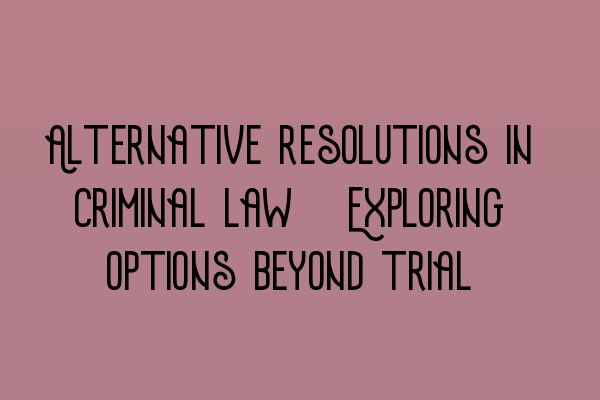Alternative resolutions in criminal law: Exploring options beyond trial
In the criminal justice system, trials are the most well-known and frequently depicted aspect, thanks to popular TV shows and movies. However, trials are not the only way to resolve criminal cases. Alternative resolutions offer options that can save time, money, and resources, while still ensuring a fair and just outcome.
1. Plea Bargaining
Plea bargaining is one of the most common alternative resolutions in criminal law. It involves negotiations between the prosecution and the defense, where the defendant agrees to plead guilty in exchange for a lesser charge, a reduced sentence, or other concessions.
For more information on plea bargaining, you can check out our related article on SQE 1 Practice Mocks FLK1 FLK2.
2. Diversion Programs
Diversion programs aim to divert offenders away from traditional criminal justice processing. These programs offer rehabilitative services, such as counseling, drug treatment, community service, or education programs, as an alternative to prosecution.
If you are interested in learning more about diversion programs, you may find our article on SQE 1 Preparation Courses helpful.
3. Restorative Justice
Restorative justice focuses on repairing the harm caused by the offense rather than punishing the offender. It involves bringing together the victim, the offender, and sometimes the community, to seek resolution through dialogue, understanding, and reparations.
To explore restorative justice further, you can refer to our article on SQE 2 Preparation Courses.
4. Arbitration and Mediation
Arbitration and mediation are alternative dispute resolution methods that can be used in criminal cases. These processes involve a neutral third party who assists in facilitating negotiations and reaching a mutually agreed-upon resolution.
If you want to learn more about how arbitration and mediation work, our article on SRA SQE Exam Dates provides more information.
5. Deferred Prosecution Agreements
Deferred prosecution agreements (DPAs) allow a criminal case to be suspended if the defendant fulfills certain conditions, such as paying restitution, participating in rehabilitation programs, or cooperating with ongoing investigations.
If you want to understand the intricacies of deferred prosecution agreements, you may find our related article on SQE 1 Practice Exam Questions helpful.
While trials are an essential part of the criminal justice system, alternative resolutions provide valuable options that can benefit all parties involved. Understanding these alternatives and their potential benefits is crucial for criminal law practitioners and defendants alike.
